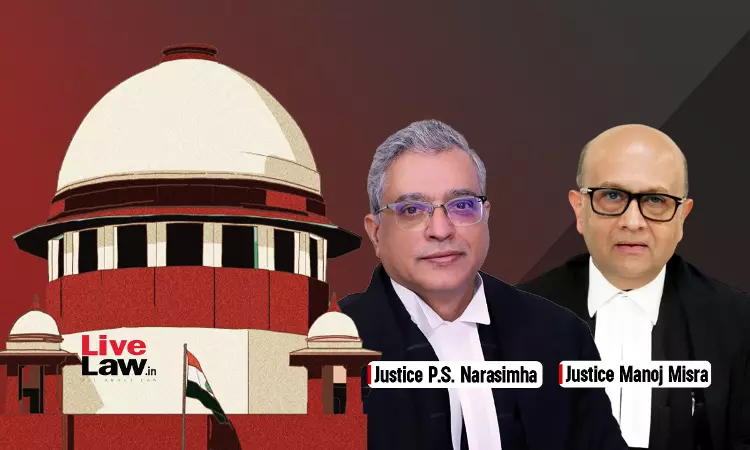- Home
- /
- Supreme court
- /
- Pollution Control Boards Can Impose...
Pollution Control Boards Can Impose Environmental Compensation On Polluting Entities: Supreme Court
Yash Mittal
4 Aug 2025 8:18 PM IST
The Supreme Court on Monday (Aug.4) ruled that the Pollution Control Boards (PCB) are empowered to impose environmental compensation on polluting entities under their statutory mandate. “the environmental regulators, the Pollution Control Boards exercising powers under the Water and Air Acts, can impose and collect restitutionary or compensatory damages in the form of fixed sum of monies...
The Supreme Court on Monday (Aug.4) ruled that the Pollution Control Boards (PCB) are empowered to impose environmental compensation on polluting entities under their statutory mandate.
“the environmental regulators, the Pollution Control Boards exercising powers under the Water and Air Acts, can impose and collect restitutionary or compensatory damages in the form of fixed sum of monies or require furnishing of bank guarantees as an ex-ante measure to prevent potential environmental damage.”, the bench comprising Justices PS Narasimha and Manoj Misra said.
The Court however, drew a line for the Boards to not impose compensation on every violation under the Acts. It is only when “some form of environmental damage or harm has been caused by the erring entity, or the same is so imminent, that the State Board must initiate action under Section 33A of the Water Act and Section 31A of the Air Act.”
The case stemmed from notices issued by the Delhi Pollution Control Committee (DPCC) to commercial and residential properties, including Lodhi Property Co. Ltd., for operating without valid environmental consents. The notices sought bank guarantees and fixed compensation as a condition for granting consent to operate.
The High Court in 2012 held that such monetary demands amounted to unauthorised penalties, which only courts could impose. The DPCC challenged the High Court's decision before the Supreme Court.
Referencing Sections 33A and 31A in the Water and Air Act, the judgment authored by Justice Narasimha observed that these sections confer wide regulatory powers, enabling Boards to take preventive, remedial, or deterrent measures, including levying monetary compensation.
In support, the Court drew sustenance from the environmental jurisprudence laid down in the landmark cases of Vellore Citizens Welfare Forum v. Union of India (1996) and Indian Council for Enviro-Legal Action v. Union Of India (1996), which upheld the idea of environmental restitution, stating it to be a constitutional and statutory obligation, not punitive action.
The court laid down the following principles, acting as a guiding point for the Boards while imposing environmental compensation on polluting entities. These are:
I. There is a distinction between a direction for payment of restitutionary and compensatory damages as a remedial measure for environmental damage or as an ex-ante measure towards potential environmental damage on the one hand; and a punitive action of fine or imprisonment for violations under Chapters VII of the Water Act and VI of the Air Act on the other hand.
II. If directions in furtherance of restitutionary and compensatory measures are issued, these are not to be considered as punitive in nature. Punitive action can only be taken through the procedure prescribed in the statute for example under chapters VII and VI of the Water and Air Acts respectively.
III. Indian environmental law has assimilated the principle of Polluter Pays and there is also a statutory incorporation of this principle in our laws. The invocation of this principle is triggered in the situations; i) when an established threshold or prescribed requirement is exceeded or breached, and it does result in environmental damage, ii) when an established threshold or prescribed requirement is not exceeded or breached, nevertheless the act in question results in environmental damage and also iii) when a potential risk or a likely adverse impact to the environment is anticipated, irrespective of whether or not prescribed thresholds or requirements are exceeded or breached.
IV. Environmental regulators have a compelling duty to adopt and apply preventive measures irrespective of actual environmental damage. Ex-ante action shall be taken by these regulators and for this purpose a certain measure in exercise of powers under Sections 33A and 31A of the Water and Air Acts is necessary.
V. The powers of the Boards under Sections 33A and 31A of the Water and Air Acts are identical to that of Section 5 of the Environment Protection Act. Under Section 5, the Central Government or its delegate has the power to issue directions to the polluting industry to pay certain amounts and utilise the said fund for carrying out remedial measures. The Boards are empowered to take similar actions under Sections 33A and 31A of the Acts.
Accordingly, the appeal was allowed.
Cause Title: DELHI POLLUTION CONTROL COMMITTEE VERSUS LODHI PROPERTY CO. LTD. ETC. (and connected matter)
Citation : 2025 LiveLaw (SC) 766
Click here to read/download the judgment
Appearance:
For Appellant(s) Mr. Ninad Laud, Adv. Mr. Saurabh Kulkarni, Adv. Ms. Rashika Narain, Adv. Ms. Ishani Shekhar, Adv. Mr. Dcosta Ivo Manuel Simon, AOR Mr. Pradeep Misra, AOR Mr. Daleep Dhyani, Adv. Mr. Suraj Singh, Adv.
For Respondent(s) Mr. Pinaki Mishra, Sr. Adv. Mr. B.b.gupta, Sr. Adv. Mr. Pravin Bahadur, Adv. Mr. Kishan Rawat, Adv. Ms. Rubi Singh Ahuja, Adv. Ms. Kanika Gomber, Adv. Mr. Rajan Narain, AOR Mr. Umesh Kumar Khaitan, AOR Mr. Ajit Warrier, Adv. Mr. Angad Kochhar, Adv. Mr. S. S. Shroff, AOR Mr. S. D. Sanjay, A.S.G. Mr. Gurmeet Singh Makker, AOR Ms. Swarupma Chaturvedi, Sr. Adv. Ms. Ruchi Kohli, Adv. Mr. Chinmayee Chandra, Adv. Mr. Chitvan Singhal, Adv. Mr. Mohit D. Ram, AOR Ms. Nayan Gupta, Adv. Mrs. Priya Puri, AOR Mr. Kailash Vashudev, Sr. Adv. Mr. Navin Prakash, AOR Ms. Srishti Prakash, Adv. Mr. Satya Darshi Sanjay, A.S.G. Ms. Swarupama Chaturvedi, Adv. Ms. Ruchi Kohli, Adv. Ms. Chinmayee Chandra, Adv. Mr. Chitvan Singhal, Adv. Mr. Amit Sharma V, Adv. Dr. N. Visakamurthy, AOR Mr. Avijit Roy, AOR



